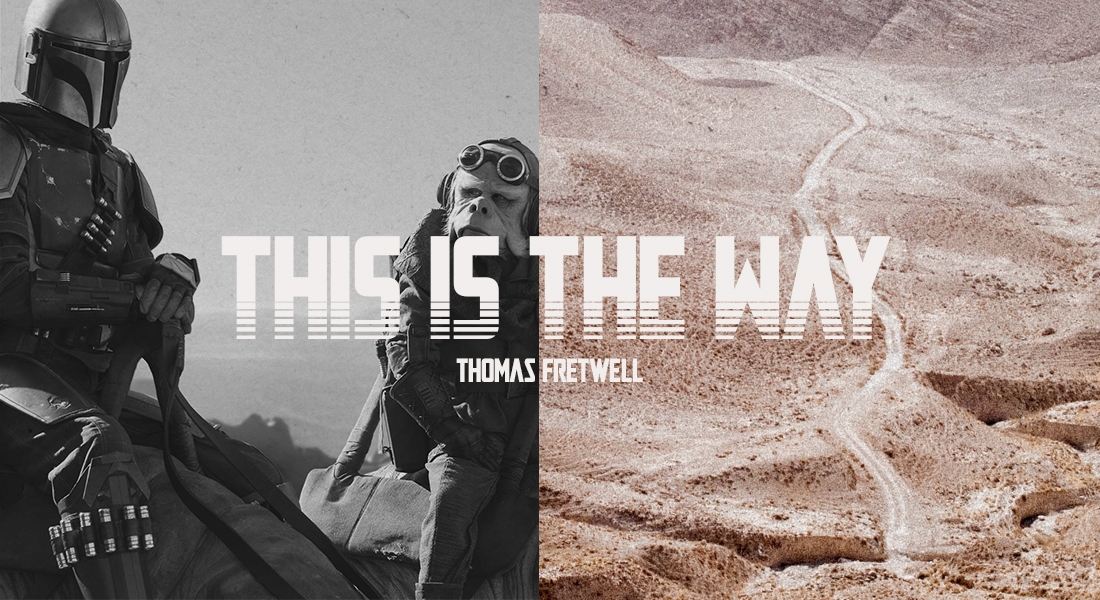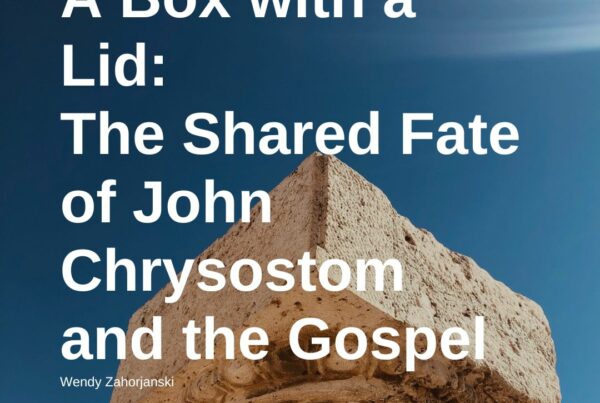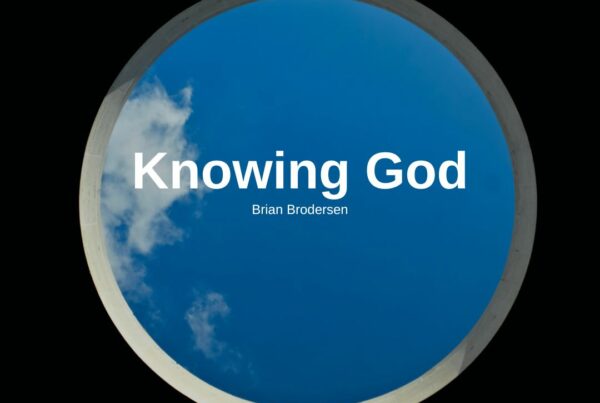
A recent edition to the Star Wars franchise is The Mandalorian TV series. It has become hugely popular with both die-hard Star Wars fans as well as the next generation of younger viewers. The Mandalorians were a group of fearsome warriors originating from the planet Mandalore. They were bound by a code of behaviour and known for their military exploits. They show up at various places throughout the Star Wars universe. The TV series is set five years after the events of Return of the Jedi (1983). It follows the exploits of a lone Mandalorian bounty hunter who is hired by Imperial forces to retrieve the child Grogu. The Mandalorian ends up forming a bond with the child and starts his own quest to return the child to the Jedi order to be trained in his abilities to use the force.
Throughout the first two series of the show, you will often hear a phrase repeated amongst the Mandalorians – “This is the Way.” It operates as statement of belief, a code of life for the Mandalorians.
The Way and Early Christianity
For anyone versed in the literature of the early Church, the phrase “the way” will be familiar. Before the term “Christian” was commonly used to designate followers of Jesus, early believers simply referred to themselves as followers of “the way!”
In Acts 9:1-2 – Saul of tarsus is hunting those belonging to The Way:
“Now Saul, still breathing threats and murder against the disciples of the Lord, went to the high priest, and asked for letters from him to the synagogues at Damascus, so that if he found any belonging to the Way.”
Later in Acts 19:9, when Paul is teaching in Ephesus, we read this:
“But when some were becoming hardened and disobedient, speaking evil of the Way before the people.”
During his trial before Felix, Paul identified with The Way:
“But this I admit to you, that according to the Way which they call a sect I do serve the God of our fathers, believing everything that is in accordance with the Law and that is written in the Prophets” (Acts 24:14) [emphasis mine].
The Creed
In the eighth episode of the first season called, “Redemption,” we have an exchange between the main character, Mando, and the former shock-trooper, Cara Dune, who often assists Mando. During this exchange, it is revealed that Mando was not actually born on the planet Mandalore – but was taken there when his home plant was attacked. This dialogue provides our next insight.
She says:
“Mandalorian isn’t a race. It’s a Creed.”
The word “creed” comes from the Latin word credo – “I believe.” They were not a race defined by ethnicity, but by a common creed, or as we would say, a statement of faith. Again, this got me thinking about the early messianic community; what a good description of the early church, a group of people from many races all united around a common creed – redemption. The song of the redeemed says:
“And they sang a new song, saying, ‘Worthy are You to take the book and to break its seals; for You were slain, and purchased for God you’re your blood men from every tribe and tongue and people and nation'” (Revelation 5:9).
The title itself gives us a clue as to what the early church unified around. Their leader spoke these words:
“Jesus said to him, “I am the way, and the truth, and the life; no one comes to the Father but through Me” (John 14:6).
To be a follower of The Way, in its purest form, was to be a follower of Jesus and His teachings. He is the unifying principle, the creed, which all followers have in common. This is why the early church had a creedal faith. We find small phrases similar to “this is the way” all through the Bible. In the New Testament the phrase, “Jesus is Lord” (1 Corinthians 12:3; Philippians 2:11) operates as a creed. It is a creed, which one day, every tongue will have to confess.
Other passages such as 1 Timothy 3:16 are also considered to be early creeds:
“By common confession, great is the mystery of godliness:
He who was revealed in the flesh, was vindicated in the Spirit, seen by angels, proclaimed among the nations, believed on in the world, taken up in glory.”
These creedal confessions continue into the writings of the Church fathers. The 2nd century father Irenaeus had his “rule of faith:”
“…This faith: in one God, the Father Almighty, who made the heaven and the earth and the seas and all the things that are in them; And in one Christ Jesus, the Son of God, who was made flesh for our salvation; And in the Holy Spirit, who made known through the prophets the plan of salvation, and the coming, and the birth from a virgin, and the passion, and the resurrection from the dead, and the bodily ascension into heaven of the beloved Christ Jesus, our Lord, and his future appearing from heaven in the glory of the Father to sum up all things and to raise anew all flesh of the whole human race…”
Then, a little later, perhaps the most well know creed of all was formulated:
The Apostle’s Creed
“I believe in God the Father Almighty, Creator of heaven and earth. I believe in Jesus Christ, his only Son, our Lord. He was conceived by the power of the Holy Spirit and born of the Virgin Mary. He suffered under Pontius Pilate, was crucified, died and was buried. He descended to the dead. On the third day he rose again. He ascended into heaven, and is seated at the right hand of the Father. He will come again to judge the living and the dead. I believe in the Holy Spirit, the holy Catholic1 Church, the communion of saints, the forgiveness of sins, the resurrection of the body, and life everlasting. Amen”
The primary themes from these creeds are worth noting. The early believers unified around the life, teaching, death, and resurrection of Jesus Christ – the Way! They accepted his atoning death as a sacrifice for sins as well as affirming His future coming in judgement. I wonder if somewhere over the last 2,000 years, we have lost our way, and allowed these central elements to become peripheral?
The Creed Made Them Distinct
For the Mandalorians, their commitment to “the way” made them easily identifiable. The had a distinctive suit of armour and were never allowed to remove their helmets in front of people. In other words, following the creed manifested itself in certain behaviours. What they believed affected what they did. This is just how it is with us as believers. We are to be identifiable by what we do – because of what we believe.
Jesus said:
“By this all men will know that you are My disciples, if you have love for one another” (John 13:35).
This radical love was to be a distinctive characteristic of followers of the way.
Elsewhere, Paul tells Titus to “adorn the doctrine of God our Saviour in every respect” (Titus 2:10). That is similar to saying, wear the teachings of Christ on you as a garment for all to see. Our commitment to the way makes us identifiable. This should be seen in our actions, our speech, and our creeds. This again serves as a reminder to the church today, to honour Christ in all these areas. The early church understood this well.
The first century discipleship manual known as the Didache begins by laying out the two ways of life and then by listing identifiable traits, which will connect you to one of the two ways:
“There are two ways, one of life and one of death, but a great difference between the two ways. The way of life, then, is this: First, you shall love God who made you; second, love your neighbour as yourself, and do not do to another what you would not want done to you.
And the second commandment of the Teaching; You shall not commit murder, you shall not commit adultery, you shall not commit pederasty, you shall not commit fornication, you shall not steal, you shall not practice magic, you shall not practice witchcraft, you shall not murder a child by abortion nor kill that which is born. You shall not covet the things of your neighbour, you shall not swear, you shall not bear false witness, you shall not speak evil, you shall bear no grudge.
And the way of death is this: First of all it is evil and accursed: murders, adultery, lust, fornication, thefts, idolatries, magic arts, witchcrafts, rape, false witness, hypocrisy, double-heartedness, deceit, haughtiness, depravity, self-will, greediness, filthy talking, jealousy, over-confidence, loftiness, boastfulness; persecutors of the good, hating truth, loving a lie….be delivered children from these things.
See that no one causes you to err from this way of the Teaching, since apart from God it teaches you.”
This is what Paul meant when he said we should “live lives worthy of the Gospel of Christ” (Philippians 1:27). We should all be willing to affirm this; we look at one another and say, “This is the Way” – our commitment, our life.
For the Mandalorian it was this commitment that meant he had to bring the Child Grogu back to the Jedi; for us, the Way is a person!
The Way is a King, a Saviour, a Friend, and an Intercessor.
So, at a time of deep division in the world and in the church, let us remember the ways of the ancient creeds. Let us again unify around the person and work of Christ, let us renew our commitment to follow all of his teaching – and let us manifest this in our words and actions so that all will know we are followers of THE WAY THE TRUTH AND THE LIFE!
To listen to the podcast of this teaching, check it out on the GoodLion Podcast Network.
NOTES:
1 This term does not denote Catholicism as we know it today – it was simply used in the sense of “universal.”
Star Wars is known for its central theme of “the force” as a belief system and a means of gaining power. CalvaryChapel.com & CGN do not necessarily agree with every element of the Star Wars story. By sharing this article, we aim to remind people of the hope and truth in Christ Jesus and encourage others toward the hope of Christ.
The Mandalorian TV series is rated TV-14 in the US for Action, Adventure, and Sci-Fi.
Images above credited to Lucasfilms.









